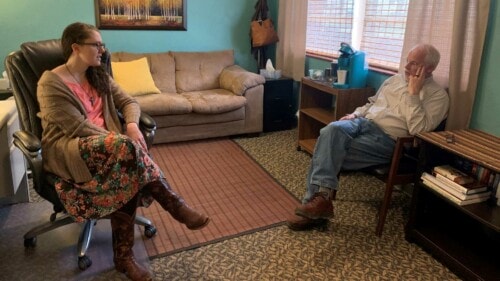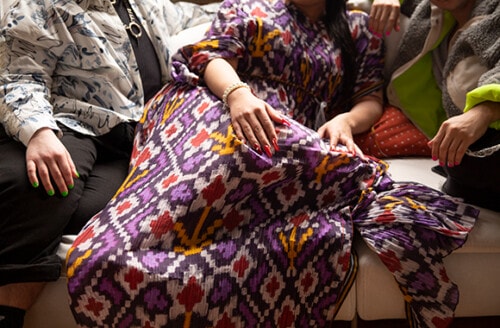For Frontline Workers, No Vaccine for Mental Health Pandemic’s toll on health care workers reveals need to keep mental health at forefront
Published April 7th, 2021 at 6:00 AM
Above image credit: The COVID-19 pandemic has had a mixed impact on mental health services on college campuses. Fewer students are reaching out for help, but those who do are seeing counselors more frequently. (File photo)A collective sigh of relief, a national exhale is almost palpable across the United States.
Vaccination rates are rising. Hope is growing that a fourth wave of COVID-19 infections can be kept at bay, along with the spread of variants.
For many, there’s a sense that the “new normal,” a stability not felt for more than a year, is on the horizon.
And yet, a cloud lingers.
“The vaccine is not going to fix mental health,” said Amy Beck, a licensed psychologist at Children’s Mercy Kansas City and an associate professor of pediatrics with the University of Missouri-Kansas City School of Medicine.
For patients with preexisting cases of depression and anxiety, along with those who developed such diagnosable conditions during the pandemic, the damage is done, Beck said.
There’s no magic shot, no one- or two-dose formula to regain mental health.
The same is true for doctors and nurses, professionals who may be reluctant to admit that they’ve experienced unprecedented levels of stress during the pandemic. Stigmas against accepting help are strong within the culture of medicine, along with concerns that doing so will affect a doctor’s licensure or reputation.
Like with so many other societal concerns, the pandemic heightened and laid bare the need to address the mental health of doctors, nurses and others who have made helping others, too often before themselves, their career choice.
A January study from the University of Utah found that more than half of health care workers – nurses, doctors and emergency personnel – are at risk of having one or more mental health problems because of COVID-19.
The study listed a number of symptoms: “acute traumatic stress, depression, anxiety, problematic alcohol use, and insomnia.”
For those within health care devoted to mental health, it’s imperative the current focus on the issue doesn’t fade.
“There is this intrinsic sense of doom and hopelessness,” said Rebeca Chow, a bilingual play therapist in the Kansas City area.
Chow explained that frontline workers were forced into mental overdrive.
Poor mental health and substance use has long been a pervasive problem for those who work in the medical field, a fact complicated by the pandemic. And physicians have long had some of the highest rates of suicide, even pre-pandemic.
Surveys are consistently tracking the exhausted state of health care workers. A recent study found that worry and stress during the pandemic have negatively affected the mental health of 62% of respondents, according to a poll of more than 1,300 front-line health care workers by the Washington Post – Kaiser Family Foundation.
A year into the pandemic, many patients say coping mechanisms that once helped don’t work anymore, said Chow, who is also the vice president of program administration at The Children’s Place.
That has forced frontline workers into mental overdrive.
In her field, it’s called “surge capacity.”

“Surge capacity is the ability that you have to face a stressful situation for a short period of time. So we gain energy. We gain all of these … coping skills that allow us to be there for two weeks,” Chow said.
“Well, what happened with COVID is (that) frontline workers can do that for two weeks, but then two weeks became three weeks. Then three weeks became two months. Then two months became a year.”
COVID-19 shut Beck, of Children’s Mercy, out of her practice at the start of the pandemic.
She was the second person at Children’s Mercy to contract the virus. She was sick, the worst that she’s ever been, for two weeks. By the time that she returned, the hospital had switched to telehealth.
Beck found herself navigating a new world, with familiar protocols upended.
Soon, she faced a situation that’s repeated itself throughout the past year. She was seeing a patient reporting suicidal ideations.
The girl, a long-term patient, also didn’t have video capability that day. The urgent session was conducted by phone. The child’s mother, who doesn’t speak English, couldn’t be reached.
“You just want to make sure that you’re doing the right thing,” Beck said. “That the kid is going to be OK.”
Eventually, an older sibling was able to drive the girl to the Children’s Mercy emergency department. The child, who had previously attempted suicide, received appropriate care, with Beck monitoring all that occurred.
But Beck admits, “I didn’t sleep very well that night.”
Humans Before Heroes
Beck’s professional world differs in one very distinct way from many other medical workers.
The field of psychology puts an emphasis on the mental state of practitioners. It’s a core principle of training, Beck said.
Medical doctors are just beginning to admit such a need.
A well-intentioned but dangerous narrative has been underscored by some media and widely adopted by the general public. It’s the idea that doctors and nurses, along with frontline health care workers of many stripes, are heroes in this battle, capable of superhuman feats over this invisible virus.
Doctors and nurses obviously have risen to the occasion, but a balancing counter-narrative is also seeking traction.
Humans Before Heroes is a campaign focused on efforts to reframe mental health questions that are asked of doctors during licensure. Questions that are too invasive can discourage doctors from seeking help, fearing that admitting a problem will affect their license to practice.
Dr. Kim Templeton of the University of Kansas Health System is a national co-chair of the Humans Before Heroes campaign by the American Medical Women’s Association (AMWA).
“If we look at the mental image of a hero, a hero is someone who can fix any problem,” said Templeton, an orthopaedic surgeon and also a past president of the AMWA.
And yet, at the beginning of the pandemic, doctors didn’t even fully understand the virus. Now, even with more knowledge and improved techniques, people still die of COVID-19.
“For some, we’re not acting like heroes because people are still dying,” she said. “I worry what that subtle message is doing to physicians.”
Kansas, partly through Templeton’s advocacy as a past president of the Kansas State Board of Healing Arts, in 2019 was among the first states to change the licensure questions, paring a list of queries down to one:
“Do you currently have a mental or physical health condition (including alcohol or substance use) that impairs your judgment or would otherwise adversely affect your ability to practice medicine in a competent, ethical, and professional manner?” (Yes/No).
‘I just remember struggling’
Mark D., a local clinic nurse who asked to remain anonymous for privacy reasons, said the initial changes to life and work were shocking.
“I just remember struggling there at the beginning,” he said. “It was a whole brand new process thrown on us very quickly.”
Someone in his household is at high risk, so he took extra precautions. Go to work. Come home. Throw scrubs into the wash. Rinse, repeat.
As with most things, he added, after a while, he got used to it. But it was painful to watch some of his nurse friends get laid off, which contributed to the stress he felt.
“For a while, I was deeply terrified, deeply anxious about (the pandemic),” said Mark D., the clinic nurse.
“Kind of my way of coping was more just relying on God and praying more. I started exercising a lot more (and) lost 30 pounds.”
While he didn’t seek help, he encouraged his peers to not be afraid of seeking counseling. At the height of the pandemic, he said, an emergency room nurse friend was put on medication for anxiety.
For other people, like social workers in the health care field, the emotional toll of caring for and treating people month after month can feel like too much.

“I think a lot of us are just shutting down to even having a conversation,” said Megh Chakrabarti, a social worker working at a local clinic.
She took a frontline health care job in June where she’s seen firsthand COVID-19’s effects on her patient’s bodies. One day they’re OK and the next they are weak. Some never come back.
Chakrabarti added: “I get the feeling that health care workers just like, don’t talk about how they’re feeling anymore because people don’t seem to care and they show that over and over again.”
There’s a disparity, she said, between the way frontline workers are hailed as heroes and the way some people have treated, or rejected altogether, public health guidelines, which keeps people like her healthy.
That weighed particularly heavily nine months into the pandemic.
“I was in a deep hole at the end of November, December,” she said. “I am so used to giving to other people. I’m not so good at checking in and trying to figure out whether or not I’m doing OK.”
She also had to reckon with putting herself at risk, being immunocompromised while seeing patients.
Outside of work, she was also hurting. She recalled the moment when she couldn’t even give her sister a hug goodbye after a socially distanced visit. It stung, leaving her confused.
The mental toll took her by surprise because, after 10 years of being a social worker, she became an introvert. Staying home, shutting down and ordering groceries became comfortable, preferable even.
In fact, she was initially OK with being at home alone with her husband in the early stages of the pandemic.
But the pandemic also stripped away the option to be with loved ones outside of her household. She felt nothing and everything at the same time, she said.
With her husband’s and friends’ support, Chakrabarti sought help from her doctor, who made changes to her medication for diagnosed depression. She’s since been feeling a little better.
“We’re working and living like this has ended,” Chakrabarti said. “But it hasn’t ended and people are still profoundly struggling.”
Chow and Beck also pointed to compounding issues such as racism and discrimination, which are weighing down people in an already delicate mental state. Beck, who treats many children of color, witnessed the effects in her own practice.

Beck said the public health crisis was two-fold. Not only were people grappling with increased anxieties and depressive symptoms because of the virus, but they were also trying to navigate racial tensions at work and at home.
“The stress for me personally … has been more impacted over the past year by the racial reckoning than the actual COVID pandemic,” she added. “That was harder for me.”
Mental health and wellness experts say early intervention and prevention could help better support physicians to reduce burnout, heightened anxiety and depression and curb substance use disorders, according to the Missouri State Medical Association.
In Jefferson City, for instance, the Missouri Physician and Health Professional Wellness Program researchers proposed a Physicians Health Program (PHP), which they called an “early warning system.”
Their approach focuses on both mental health and wellness, which takes into account the “intellectual, emotional, physical, environmental, financial, occupational, spiritual, and social.”
Chow agrees.
Advocates and mental health leaders point to a need for accessible and confidential resources. They fear, however, that it’ll take time for folks who work in the health care industry to realize they need help.
She likens the impending mental health crisis to a paper cut, not knowing exactly when one’s wounded but feeling the pain later on.
“(The pandemic) changed them,” Chow said.
“When you are in the midst of surviving and your brain is activated to just go, go, go,” Chow said. “No brain can handle that much. So something has to crack, right?”
Helpful Resources:
+ Read the Center for Disease Control guide to coping with stress and list of resources here.
+ Access free essential therapy for essential workers via the Therapy Aid Coalition here.
+ See the directory of free mental health professionals and find your support network via The Emotional PPE Project here.
+ The Frontline Therapy Network supports frontline workers such as first responders, medical personnel and veterans. Click here.
+ Get trauma-informed counseling for free via 911 At Ease International by clicking here.
+ If you’re feeling overwhelmed or not like yourself, take this short online screening from the comfort of your own home.
+ Need help now? Call the National Suicide Prevention Hotline at 1-800-273-TALK, or text “MHA” to 741-741 to talk to a trained counselor from the Crisis Text Line.
Flatland contributor Mary Sanchez is a Kansas City-based writer and a nationally syndicated columnist with Tribune Content Agency. Vicky Diaz-Camacho covers community affairs for Kansas City PBS. Cody Boston is a video producer for Kansas City PBS.
Thursday on Kansas City PBS
Coverage of “The Hidden Pandemic” is made possible with the support of William T. Kemper Foundation – Commerce Bank, Trustee, Hall Family Foundation and Marlese & Robert Gourley.










